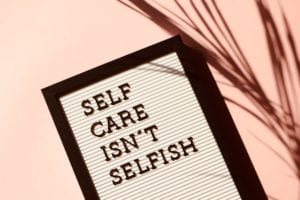By Ellen Albright, Director of Talent + Workforce Development
We hear simple daily reminders like – “Safety First” and “Always Put Family First” echoed by many of our peers and supervisors as guiding principles for work and life-balance. But, what happens when a global pandemic challenges “safety first” by making it necessary to show up to work despite the fear of catching a virus? What happens when “family first” gets taken to the next level, where parents are being forced to decide between continuing to work or becoming full-time virtual learning support aids to their kids? 2020 has forced these issues to the front lines and are testing everyone in some way.
“Covid-19 has put mental health front and center for organizations as the safety of employees becomes paramount to survival. New research is indicating that employees are putting in more hours than ever, experiencing burnout and exposure to added stressors such as finances or the inability to separate personal and professional commitments and roles. These shifts and changes are pushing employee well-being up the ladder of corporate priorities.” – Forbes.Com Article, What the Future of Work Means for our Mental Health, Contributed By: Ashley Stahl.

Now more than ever, the spotlight on mental health is becoming fully realized by employers and individuals alike. While it was never truly feasible to keep work and mental health issues separate, it is now far more acknowledged, studied and its impacts understood by the corporate world. Taken from the previously mentioned Forbes.com article:
“Mental illness is the world’s leading cause of disability and is estimated to cost the global economy $16 trillion by 2030 as a result of lost earnings and the cost of health insurance. According to the study by Oracle and Workplace Intelligence, the Covid-19 pandemic has only added to this, with 78% of the global workforce reporting a negative impact on their mental health.”
We asked a few employers in Greater Reading to weigh in on this topic. Here is what they had to say:
Kristi Gage-Linderman, SHRM-CP, PHR, Chief Operating Officer | Gage Personnel
“Our motto right now is “happy and healthy for the holidays” – we will continue to do whatever it takes to get through this, and we will come out of this unprecedented time stronger for it.”
Throughout COVID-19, we were careful to acknowledge and understand the importance of mental health in general and share tools with our team, while reminding them that we are here to support them and their families. We encourage open and honest communication, letting people know that it’s okay to have fears and concerns, or to be just completely “over” all of it.
By simply acknowledging that we, too, recognize the struggles that so many are facing, and the uncertainties of what the future might hold enables us to address issues on a personal level.
Truly, it just comes down to being human and putting people first. Making sure they feel safe. That they have a choice. That they can take steps to protect themselves and others. While the world feels like it’s out of control, they can still be productive and make healthy choices. We are all looking forward to brighter days ahead, and we’re not giving up on finding the good even during tough times.
Dr. Jill M. Hackman, Executive Director | Berks County Intermediate Unit
As an organization, the Berks County Intermediate Unit (BCIU) has used several strategies to support the psychological well-being of employees. These strategies include:
-
- The development of a self-care and wellness website for employees that highlights a variety of resources and strategies including self-compassion, self-care action planning, yoga, breathing exercises and more.
- BCIU School Psychologists led “Let’s Connect” virtual sessions to discuss challenges, connect socially and offer support.
- Continually share articles and resources related to self-care, mental health and wellness.
- Provide flexibility in work schedules and locations to assist employees feeling anxious or stressed about the impact of COVID-19 in the workplace.
Over the past nine months, we have routinely reminded BCIU employees about the Quest Employee Assistance Program (EAP) that we offer. To ensure this benefit was easily accessible, a website link and contact information was prominently displayed on our employee intranet. In addition, newsletters and other helpful resources provided by Quest EAP were distributed to BCIU employees.
We are holding a virtual webinar in December for all employees to educate them about the impact of uncertainty and change on stress cycles and the ability to cope. The webinar will include topics such as physiological response to stress, grief cycles, responses to change and coping strategies one can put into daily routines.
Our goal as an organization has been to speak openly about mental and emotional well-being and encourage employees to focus on all aspects of their health during these times. Additionally, as leaders, we make it a priority to model self-care behaviors and support employees who may be seeking assistance or guidance.
Employees across the organization have shared their appreciation that we recognize and validate the challenges presented over the past year. Many have acknowledged the continuous support and access to resources.
As a bonus, we asked Dr. Hackman – “Are there coping/self-care tips that can be communicated to employees that you have found helped?”
The following quote was recently shared with a group of supervisors at the BCIU. It shares the importance of practicing self-care at work.
 “Self-care is something that can happen at work too, with practices such as taking breaks, advocating for yourself, or asking a colleague for support. Although the self-care you do at home might be different than the self-care you do at work, we need to be careful of not separating self-care from work. Because burnout can impact the quality of your work, preventing burnout and prioritizing self-care is an ethical and professional responsibility.” – Ami Kunimara, MA, MT-BC, “What is Self-Care?”, October 2020
“Self-care is something that can happen at work too, with practices such as taking breaks, advocating for yourself, or asking a colleague for support. Although the self-care you do at home might be different than the self-care you do at work, we need to be careful of not separating self-care from work. Because burnout can impact the quality of your work, preventing burnout and prioritizing self-care is an ethical and professional responsibility.” – Ami Kunimara, MA, MT-BC, “What is Self-Care?”, October 2020
Debra Antol, Director of Human Resources | Sweet Street Desserts
We have been able to support our employees by spreading awareness and communication of our Employee Assistance Program (EAP). To best support this, supervisors, managers and HR staff have been trained to make referrals to the EAP program. Routine communications to employees have proven extremely helpful with information included on the services provided through the EAP, allowing them to understand what it can do for them during such challenging times.
Various coping and self-care tips have been shared through our monthly newsletters. We also prepared a Coping with COVID-19 postcard which was sent to employees. In general, we’ve heard over and over how much the pandemic and related issues have caused a great deal of increased stress and anxiety in 2020. We are doing our best to maintain frequent communication with our employees, ensuring referrals are made when appropriate and support networks are in place for our employees to turn to!
Rick Wolf, Servant Leader | Embrace the Challenge
We must acknowledge the idea of grief in the workplace, and take into consideration the various ways this will show up:
The Bereaved: Those that have lost friends + family due to COVID-19;
The Affected: Those who have had COVID-19, had to isolate/quarantine, those who are caretaking for others;
The Working Well: Our biggest demographic – those who appear to be working well, but are grieving because they have lost a way of life. They are grieving lost opportunities, socializing with friends/colleagues and missed events/celebrations (weddings, family gatherings, or a ceremony).
It is imperative for businesses to understand that members of their team are grieving in different ways and organizational leaders need to help their employees develop their resilience throughout this pandemic as it evolves. One of the simplest strategies is through the expression of gratitude.
Here’s a simple exercise from “Resilience and the Practice of Gratitude”: For the next five (5) days:
 Reflect and write one thing that made you happy that day. Push a little deeper by thinking about it and describing at least two more words associated with the reasons why you were happy.
Reflect and write one thing that made you happy that day. Push a little deeper by thinking about it and describing at least two more words associated with the reasons why you were happy.- Reflect and write one thing someone else did nice for you today. This doesn’t have to be anything big either, just something that someone did for you that was nice.
- Reflect and write one thing you did nice for someone today. I’m certain you did many things nice for others, the point is picking one, reflecting on it and writing about it.
It feels good to reflect and write about the good things in our life. By doing it repeatedly, we work toward establishing a habit of seeking what is positive in our life, which, in turn, fosters the development of resilience.
Wolf has been helping local businesses create programming around this idea of resilience and growth. He hosts “open calls” for employees to participate and assist them in managing their grief with resilience and growth pointers.
For more content on how to best support your employees (and yourself!), check out the GRCA Events Calendar. Upcoming relevant sessions for December include:
Dec. 8: Addressing Isolation during the pandemic and wintertime
Dec. 14: Power of the Pause during COVID
Dec 15: Emotional Intelligence: Not Another Soft Skill
Dec. 17: Connecting for better well-being during the Covid crisis


 Reflect and write one thing that made you happy that day. Push a little deeper by thinking about it and describing at least two more words associated with the reasons why you were happy.
Reflect and write one thing that made you happy that day. Push a little deeper by thinking about it and describing at least two more words associated with the reasons why you were happy.